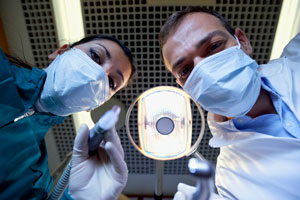
By Andrea Kowalczyk, RDH, BS, lead talent acquisition partner – dental hygiene
Shedding light on practicing hygiene in corporate dentistry
Two words: Corporate. Dentistry. What are the first thoughts that most hygienists associate with this? Are they warm and positive? Negative and skeptical? Confused?
For hygienists considering joining a dental service organization, what are some of their biggest concerns?
Oversight and Protection
Some of us assume that when a company employs a large staff it means those employees are an under-supervised lot left to their own untrained and detached whims.
 DSOs are generally large and highly visible. When groups are large, processes simply don’t fly under the radar as much. While every dental enterprise, whether one dentist or one thousand, must adhere to OSHA standards, not all of them do. When companies are larger, they are a bigger and more visible target. The chances that they are OSHA compliant and then some increases. In my group, OSHA standards are religion, and we employ degreed, OSHA trained professionals who keep us compliant and lend support when we have questions. We all receive regular compliance training and are subject to frequent audits. The misconception is that because a dental group is large, it must mean they are sloppy with the rules. In my experience, it is the opposite that’s true.
DSOs are generally large and highly visible. When groups are large, processes simply don’t fly under the radar as much. While every dental enterprise, whether one dentist or one thousand, must adhere to OSHA standards, not all of them do. When companies are larger, they are a bigger and more visible target. The chances that they are OSHA compliant and then some increases. In my group, OSHA standards are religion, and we employ degreed, OSHA trained professionals who keep us compliant and lend support when we have questions. We all receive regular compliance training and are subject to frequent audits. The misconception is that because a dental group is large, it must mean they are sloppy with the rules. In my experience, it is the opposite that’s true.
Diversity of thought
The thinking is that the more moving pieces something has, more things can break or go wrong with it. This might be true for washing machines, but not with groups of talented people. The more capable people a company employs, more things can go right. I am fortunate enough to work with literally hundreds of people who are smarter than me and have innovative ideas and unique perspectives and experiences. Where would we be without these beautifully diverse minds, all contributing to the same goal? We wouldn’t be as successful as we are. It is a fascinating thing to get to watch. It has made me a more well-rounded and open-minded person.
Like most hygienists, I enjoy my clinical colleagues. At the same time, it never fails to be a novel and fascinating experience to spend time with my team members from other disciplines, such as marketing, acquisitions, training and so on. For a hygienist, proximity to those individuals are limited at best in the private practice realm.
Improved grievance resolution
If an employee experiences discrimination or harassment, having an HR department to consult with is invaluable. If a hygienist should encounter disagreements with teammates that cannot be addressed within their practice, DSOs will often have multiple professionals on staff who can help resolve conflicts before they turn unpleasant or the hygienist feels compelled to resign.
Room to grow
When you work as a hygienist in a small private office, your options for vertical career growth within the practice are limited. They amount to going to dental school or…well, that’s pretty much it. You could become a lead hygienist, but your day-to-day job hasn’t fundamentally changed. What happens when you decide you want to stay in the hygiene space but can no longer treat patients due to injury, or you simply want to try something new?
In a corporate environment, opportunities for hygienists to grow and develop abound. I began at my corporate group as a clinical hygienist, became a hygiene mentor and now work as a recruiter. A friend of mine began as a hygienist, became a mentor and is now the operations director of his group. A hygienist colleague of mine is heading up a recruiting and credentialing department in our group. Another friend who began her early career as a hygienist is now one of our directors of operations. I also know a very talented person who began with us as a hygienist and is now our director of hygiene. These types of opportunities don’t exist in a private practice. While not everyone is looking to trade in their scalers for a briefcase, it is nice to know you have options should you choose to pursue them.
Peer support
When I was in hygiene school, we had a program called Big Sisters and Brothers. Second-year students were paired with a freshman student, the idea being that the student who was further along in the program could act as a mentor for the newbie. I adored my big sister. She sent me encouraging notes, lent me her study notes and met me for lunch to offer advice during that brutal freshman year. In my DSO, we have hygiene mentors, who essentially are real-world big sisters and brothers. These more seasoned hygienists are there to answer clinical questions, talk over tough cases or offer encouragement. When I began work as a clinical hygienist at my DSO, my mentor was my lifeline. Having this kind of support is critical for hygienists new to the field, and it’s a rarity.
Protocols
I’ve never loved the term corporate dentistry because it implies that the dentistry being done is dictated by non-clinical corporations. It gives the false impression that the people directing treatment wear suits, not scrubs, and that it’s somehow different than the dentistry being done everywhere else. In the majority of cases, this is false. The dentistry performed in corporate offices is not mysterious. In most cases, groups under the direction of dentists and hygienists will follow the recommended guidelines for treatment that we all learned in school and evolve when new evidence is released. If you have ever been encouraged to perform bloody prophies in a private office, you can appreciate how having some evidence-based clinical guidelines in place to guide your team would come in handy.
Security
Not many small, private offices can afford to offer a full, generous benefit package to hygienists. Many DSOs can. I recently wrote about the perils of hygienists who depend on being able bodied. If they become injured or sick and can’t work for an extended period, they can be financially ruined. Having medical, retirement, life and disability insurance, accidental death and dismemberment, supplemental hospital coverage, etc.…can ensure you and your family are protected and won’t end up adrift should life throw you a curve ball. Benefits are more than a perk. They are a necessity for most of us.
Mobility
Moving two hours or two states away? Do you have a new baby and need to reduce your hours? In the DSO world, you don’t necessarily have to quit your job and pound the pavement in search of a new one. Chances are, your group has an office closer to your new home that you can transfer into, or an office nearby that can accommodate your new schedule availability. You won’t lose your seniority or benefits. Plus, the learning curve will be a breeze.
Social opportunities
In a private office, it’s common to have no more than eight team members total. If you dislike three of them, you’re in trouble. In a large group setting, you have the benefit of having a large network of peers. It evens out if you aren’t keen on everyone. I can’t imagine my life without the kind, talented friends and mentors I have accumulated during my years with my DSO. Just like with private offices, opportunities exist for community service, practice team building, holiday celebrations and community involvement.
Ultimately, corporate dentistry is not for everyone. Neither is private practice. That’s what diversity and inclusion are about, and it’s healthy. But, I encourage my hygiene friends not to shy away from corporate dentistry if they have been curious about it. Don’t hamstring your career based on unexplored options. Read patient and employee reviews online. Find a group that suits you, and you may surprise yourself when you thrive. If one DSO is not to your taste, try another. Not all DSOs are created equal and each company culture is as varied as the people within it.
Who knows? You may find that corporate dentistry offers what has been missing in your career. If you are in search of opportunity, security and comradery, get a jump on the future and consider large group dentistry. Chances are, you’ll be in good company!
Editor’s note: Andrea Kowalczyk, RDH, BS, is the Lead Talent Acquisition Partner for a leading DSO. She has worked as a clinical hygienist, a hygiene mentor, consultant and speaker and publishes in several magazines, including First Impressions Magazine. For more information visit [email protected].

